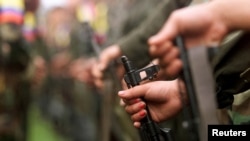Women will make up more than half of all judges in Colombia's war tribunals, a historic move that gives women an equal say in building peace after half a century of war.
Under a peace deal signed last year between the government and rebels from the Revolutionary Armed Forces of Colombia (FARC), war tribunals will seek to prosecute those responsible for human rights atrocities committed in the civil war.
Women will account for 53 percent of those people selected to serve as court judges, promoting gender equality in the top echelons of justice.
"The top courts have been a restricted space for women, especially for Afro-Colombian and indigenous women," said Xiomara Balanta, an Afro-Colombian woman, and one of 27 female judges out of 51 people appointed.
While Colombia has made progress in recent decades in increasing women's participation in politics and the judiciary, gender parity is still a distant goal.
"We're properly prepared to participate .. this is a historic moment," Balanta told the Thomson Reuters Foundation.
Colombia's war has claimed the lives of 220,000 people, and women have borne the brunt of the conflict, including sexual violence, rape and forced displacement.
Of the women judges appointed, more than 10 percent are Afro-Colombian and a further 10 percent come from indigenous groups.
Having a more gender equal and ethnically diverse set of judges means they are more likely to recognize that Colombia's war affected different groups in society in different ways.
"Women have an affinity for gender issues .. that women, and the LGBT community, have suffered [the conflict] and have felt pain in different ways," Balanta said.
Rights groups applauded the move, saying it was "without precedent" and an "early victory" for women to ensure they play their rightful role as leaders in peace building.
"We celebrate this triumph of women in decision-making scenarios," the National Summit of Women and Peace, a network of women's rights group in Colombia, said in a statement.
Ensuring female participation strengthens prospects for sustainable peace, while having women at the negotiating table increases the chance of a peace accord lasting 15 years by 35 percent, according to a 2015 study by the International Peace Institute.
Under the accord, Colombia will have a so-called 'Special Jurisdiction for Peace' (JEP) of tribunals, truth commissions and investigative units to try former rebel fighters, state military and civilians who have committed rights abuses.
Balanta said judges will hear thousands of testimonies over the next 15 years of human rights atrocities, including rape, forced disappearances and massacres, aiming to uncover the truth about what happened during the war.
Lawmakers are currently debating a bill to provide the legal framework for the JEP, with a decision expected in November.
War tribunals are likely to come under great scrutiny and pressure by those Colombians who demand tougher sanctions and jail time for FARC rebels.
"Colombia has to understand this is a process that requires reconciliation and forgiveness," Balanta said. "It's about restorative and not just punitive justice."





